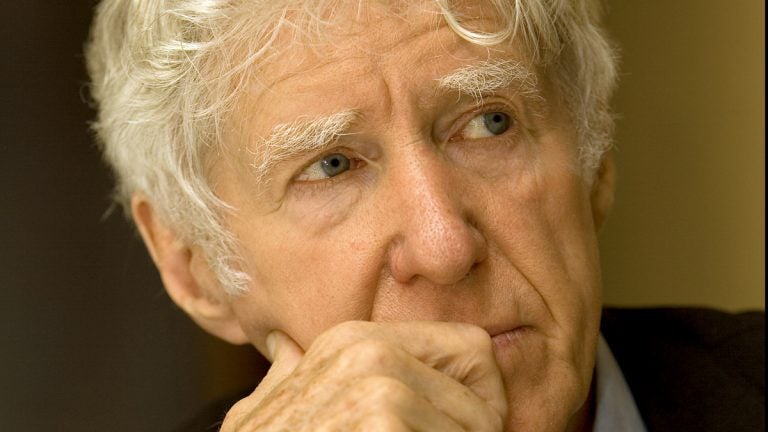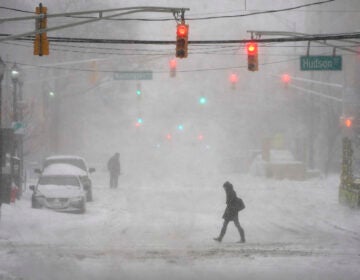Earth Policy Institute founder Lester Brown to speak in Princeton Oct 29

Lester Brown has released the new autobiography Breaking New Ground: A Personal History
It is the classic story of a poor boy who believed in the power of hard work to get ahead. Pictures from his childhood growing up and laboring on a South Jersey farm look like something straight out of James Agee and Walker Evans’ Let Us Now Praise Famous Men.
Born in a small house for hired hands near Bridgeton, N.J. Lester Brown was the son of a farmhand and a domestic. His father had to drop out of school at age 12 to support his single father raising three other children, who worked picking strawberries and cutting asparagus. Brown’s grandfather supported the family by digging ditches in the winter. There were no toys to play with for young Lester, nor cameras to record family life – just work to be done.
Today, Brown, one of the world’s most influential thinkers, is best known for founding both the World Watch Institute and Earth Policy Institute, and for writing more than 50 books on global environmental issues. He has influenced U.S. presidents, the United Nations and leaders around the world, and Edward O. Wilson has called him one of the great environmentalists of our time.
But his life is deeply rooted in the soil of New Jersey, and he credits his early experience as a tomato farmer for leading to his becoming a global analyst and the guru of the environmental movement. The MacArthur Genius Award Winner will pay a visit to D&R Greenway Land Trust’s Johnson Education Center October 29 to discuss his newest book, Breaking New Ground: A Personal History.
Breaking New Ground starts with Brown’s recruiting his younger brother, borrowing a tractor to grow tomatoes on weekends. By 1958 that operation was producing 1.5 million pounds of tomatoes. Brown went to Cook College to study agriculture, with the objective of becoming a bigger and better tomato farmer.
After a master’s degree in public administration at Harvard Brown spent six months living in rural India. He immediately became aware of how overpopulation was undermining food production. Issues of decreasing crop production, global warming, population control, women’s education, energy and water resources depletion are all connected, he learned. At age 31, just a few years off the farm, Brown found himself advising policy leaders in New Delhi.
Brown observed how, as population grew, agricultural production went up at first, but as industrialization increased, there was less agricultural land available to meet the spiking demand for food. “You have a country that’s basically in balance, and then production goes down and consumption begins to rise so imports go up very fast.” He applied that model to China to anticipate the day when China would become heavily dependent on imports. He wrote Who Will Feed China. “In 1995, China produced 14 million tons of soybeans and consumed 14 million tons of soybeans,” says Brown. “In 2010 they produced 14 million tons of soybeans and consumed 70 million tons of soybeans. They are now importing 80 percent of their soybeans.”
Breaking New Ground: A Personal History traces Brown’s life as the son of a sharecropper to one who dines with heads of state. He makes it clear in the preface that his goal is not self-aggrandizement, but to help inspire others. “My motivation comes from seeing the problems facing humanity, and the need to do something about them while there is still time,” he says.
Brown admits he was always looking for ways to challenge the establishment, and while working for the USDA, he and a colleague “repurposed” the old carpeting torn from the office of more senior level officials who were getting an upgrade. The immediate effect was Brown and his colleague were viewed as important because their office was now carpeted.
In order to meet his deadline to create agricultural supply and demand projections for the world in 1962, he pulled a series of all-nighters, dozing on the leather sofa in the offices of the administrator. “My great fear was that one day I’d oversleep and he would discover me,” Brown writes. Instead, those projections were published in a U.S. News & World Reports cover story, “Why Hunger is to be the World’s No. 1 Problem.”
Climate change adds another huge threat to food security. “Agriculture as we know it today evolved over an 11,000 year period. Agriculture and the climate system were very much in sync with each other, but now, what worries me is that’s beginning to change, and it leaves you with a helpless feeling. When you look at the heat and the drought the U.S. experienced in 2012 – and we’re the most technologically advanced country in the world – there’s just not much we can do about it. We’re just sitting there, watching and hoping… My goal is to be neither optimistic or pessimistic but realistic.”
What can be done? “Cut carbon emissions fast, 80 percent by 2020. (It’s what we need to do) to protect the future of civilization itself.”
Lester Brown will launch his new book, Breaking New Ground: A Personal History, October 29, at D&R Greenway Land Trust Johnson Education Center, 1 Preservation Place, Princeton, 6:30 p.m. reception, 7-8 p.m. lecture. RSVP. www.drgreenway.org
_____________________________________________
Ilene Dube is a communications consultant with the D&R Greenway Land Trust. She also writes The Artful Blogger, which offers a look inside the art world of the greater Princeton area. Dube is an award-winning arts writer and editor, as well as an artist, curator and activist for the arts.
WHYY is your source for fact-based, in-depth journalism and information. As a nonprofit organization, we rely on financial support from readers like you. Please give today.





